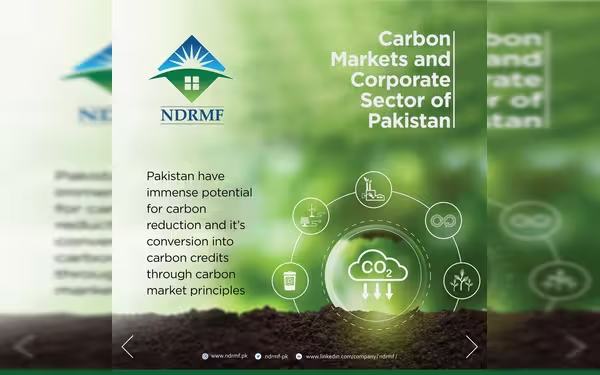Thursday, July 4, 2024 07:44 PM
Pakistan leads sustainable efforts through carbon markets
- Pakistan integrates carbon markets for emissions reduction and sustainable development
- Circular economy model key to Pakistan's strategy for balancing economic progress and environmental stewardship
- Collaboration with U.S. in 'Green Alliance' paves way for sustainable infrastructure development
 Image Credits: NDRMF
Image Credits: NDRMFPakistan is leveraging carbon markets and circular economy practices to address climate change while promoting economic growth. Collaboration with the U.S. in the 'Green Alliance' offers opportunities for sustainable infrastructure development.
In the global push for sustainable environmental practices, countries are increasingly turning to innovative solutions to combat climate change. One such promising tool is the use of carbon markets, particularly in the realm of multilateral diplomacy. By integrating carbon market mechanisms into their national climate policies, nations can take a significant step towards reducing emissions and promoting sustainable development.
This shift is especially crucial for developing countries like Pakistan, where the dual challenge of addressing climate issues while ensuring economic growth and social welfare looms large. Positioned at the crossroads of economic development and climate resilience, Pakistan plays a vital role in global climate change efforts. Leveraging industries such as textiles and agriculture, Pakistan sees opportunities to implement circular economy practices and carbon reduction initiatives.
The circular economy model, focused on minimizing waste and maximizing resource efficiency, is central to Pakistan's strategy. By encouraging industries to adopt cleaner technologies and sustainable practices, Pakistan aims to strike a balance between economic progress and environmental stewardship, ultimately reducing its carbon footprint.
Aligned with the Paris Agreement's Article 6, Pakistan seeks not only to advance its national sustainability goals but also to make significant contributions to regional and global climate initiatives. Challenges such as limited awareness and infrastructure for waste management highlight the need for targeted educational programs and strategic investments.
Despite obstacles, the engagement with carbon markets offers promising prospects for Pakistan. Through revenue generation from carbon credit trading, attracting international investments, and aligning with global climate commitments, Pakistan can further solidify its position as a key player in sustainability efforts.
Collaborations with the U.S. in climate-resilient infrastructure, under the 'Green Alliance,' could pave the way for knowledge transfer, financial aid, and capacity building in renewable energy, waste management, and sustainable agriculture. Overcoming challenges like regulatory clarity and financial barriers will be crucial for businesses to confidently participate in carbon markets and embrace circular economy principles.
By navigating these hurdles and embracing a collaborative, innovative approach in line with the Paris Agreement, Pakistan can lead the charge towards a sustainable future. Engaging with both the government and private sector in carbon trading involves understanding regulatory frameworks, developing carbon reduction projects, and fostering partnerships to drive awareness and action.













